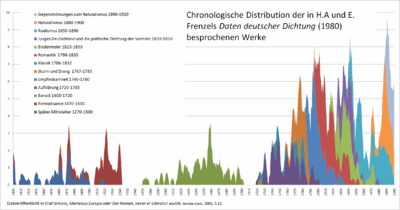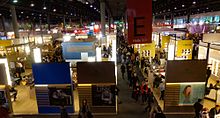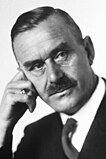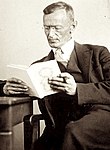German literature
This article includes a list of generalreferences,butit lacks sufficient correspondinginline citations.(June 2022) |

German literature(‹See Tfd›German:Deutschsprachige Literatur) comprises thoseliterarytexts written in theGerman language.This includes literature written inGermany,Austria,the German parts ofSwitzerlandandBelgium,Liechtenstein,Luxembourg,South Tyrolin Italy and to a lesser extent works of theGerman diaspora.German literature of the modern period is mostly inStandard German,but there are some currents of literature influenced to a greater or lesser degree bydialects(e.g.Alemannic).
Medieval German literature isliteraturewritten in Germany, stretching from theCarolingian dynasty;various dates have been given for the end of the German literary Middle Ages, theReformation(1517) being the last possible cut-off point. The Old High German period is reckoned to run until about the mid-11th century; the most famous works are theHildebrandsliedand a heroic epic known as theHeliand.Middle High Germanstarts in the 12th century; the key works includeThe Ring(c. 1410) and the poems ofOswald von WolkensteinandJohannes von Tepl.The Baroque period (1600 to 1720) was one of the most fertile times in German literature. Modern literature in German begins with the authors ofthe Enlightenment(such asHerder). The Sensibility movement of the 1750s–1770s ended withGoethe's best-sellingThe Sorrows of Young Werther(1774). TheSturm und DrangandWeimar Classicismmovements were led byJohann Wolfgang von GoetheandFriedrich Schiller.German Romanticismwas the dominant movement of the late 18th and early 19th centuries.
Biedermeierrefers to the literature, music, the visual arts and interior design in the period between the years 1815 (Vienna Congress), the end of theNapoleonic Wars,and 1848, the year of theEuropean revolutions.Under theNazi regime,some authors went into exile (Exilliteratur) and others submitted to censorship ( "internal emigration",Innere Emigration). TheNobel Prize in Literaturehas been awarded to German language authors fourteen times (as of 2023), or the third most often, behind only French language authors (with 16 laureates) and English language authors (with 32 laureates) with winners includingThomas Mann,Hermann Hesse,Günter Grass,andPeter Handke.
Periodization
[edit]Periodizationis not anexact sciencebut the following list contains movements or time periods typically used in discussing German literature. It seems worth noting that the periods ofmedievalGerman literature span two or three centuries, those of early modern German literature span one century, and those of modern German literature each span one or two decades. The closer one nears the present, the more debated the periodizations become.

The Diagram was first published in Olaf Simons,Marteaus Europa, oder Der Roman, bevor er Literatur wurde(Amsterdam/ Atlanta: Rodopi, 2001), p. 12. It does not give a picture of the actual production of German literature, but the selection and classification of literary works by Herbert Alfred and Elizabeth Frenzel.[1]
- Medieval German literature
- Old High German literature(750–1050)
- Middle High German literature(1050–1350)
- Late medieval / Renaissance (1350–1500)
- Early Modern German literature (seeEarly Modern literature)
- HumanismandProtestant Reformation(1500–1650)
- Baroque(1600–1720)
- Enlightenment(1680–1789)
- Modern German literature
- 18th- and 19th-century German literature
- Empfindsamkeit/ Sensibility(1750s–1770s)
- Sturm und Drang/ Storm and Stress(1760s–1780s)
- German Classicism (1729–1832)
- Weimar Classicism(1788–1805) or (1788–1832), depending on Schiller's (1805) or Goethe's (1832) death
- German Romanticism(1790s–1880s)
- Biedermeier(1815–1848)
- Young Germany(1830–1850)
- PoeticRealism(1848–1890)
- Naturalism(1880–1900)
- 20th-century German literature
- 1900–1933
- Fin de siècle(c. 1900)
- Symbolism
- Expressionism(1910–1920)
- Dada(1914–1924)
- New Objectivity(Neue Sachlichkeit)
- Well Known Writers of the 20th Century
- 1933–1945
- National Socialist literature
- Exile literature
- 1945–1989
- By country
- Federal Republic of Germany
- German Democratic Republic
- Austria
- Switzerland
- Other
- By thematic or group
- Post-war literature (1945–1967)
- Group 47
- Holocaust literature
- By country
- 1900–1933
- Contemporary German literature (1989–)
- 18th- and 19th-century German literature
Middle Ages
[edit]Medieval German literature refers toliteraturewritten in Germany, stretching from theCarolingian dynasty;various dates have been given for the end of the German literary Middle Ages, theReformation(1517) being the last possible cut-off point.
Old High German
[edit]The Old High German period is reckoned to run until about the mid-11th century, though the boundary to Early Middle High German (second half of the 11th century) is not clear-cut.
The most famous work in OHG is theHildebrandslied,a short piece of Germanic alliterative heroic verse which besides theMuspilliis the sole survivor of what must have been a vast oral tradition. Another important work, in the northern dialect of Old Saxon, is a life of Christ in the style of a heroic epic known as theHeliand.
Middle High German
[edit]Middle High Germanproper runs from the beginning of the 12th century, and in the second half of the 12th century, there was a sudden intensification of activity, leading to a 60-year "golden age" of medieval German literature referred to as themittelhochdeutsche Blütezeit(1170–1230). This was the period of the blossoming of MHG lyric poetry, particularlyMinnesang(the German variety of the originally French tradition ofcourtly love). One of the most important of these poets wasWalther von der Vogelweide.The same sixty years saw the composition of the most important courtly romances. These are written in rhyming couplets, and again draw on French models such asChrétien de Troyes,many of them relatingArthurianmaterial, for example,ParzivalbyWolfram von Eschenbach.The third literary movement of these years was a new revamping of the heroic tradition, in which the ancient Germanic oral tradition can still be discerned, but tamed and Christianized and adapted for the court. These high medievalheroic epicsare written in rhymed strophes, not the alliterative verse of Germanic prehistory (for example, theNibelungenlied).
The Middle High German period is conventionally taken to end in 1350, while theEarly New High Germanis taken to begin with theGerman Renaissance,after the invention of movable type in the mid-15th century. Therefore, the literature of the late 14th and the early 15th century falls, as it were, in the cracks between Middle and New High German, and can be classified as either. Works of this transitional period includeThe Ring(c. 1410), the poems ofOswald von WolkensteinandJohannes von Tepl,the German versions ofPontus and Sidonia,and arguably the works ofHans FolzandSebastian Brant(Ship of Fools,1494), among others. TheVolksbuch(chapbook) tradition which would flourish in the 16th century also finds its origin in the second half of the 15th century.
Early Modern period
[edit]German Renaissance and Reformation
[edit]| Reformation-era literature |
|---|
- Sebastian Brant(1457–1521)
- Thomas Murner(1475–1537)
- Martin Luther(1483–1546)
- Philipp Melanchthon(1497–1560)
- Sebastian Franck(1500–1543)
- Johann Fischart(1545-1591)
Baroque period
[edit]The Baroque period (1600 to 1720) was one of the most fertile times in German literature. Many writers reflected the horrible experiences of theThirty Years' War,inpoetryandprose.Grimmelshausen's adventures of the young and naïve Simplicissimus, in the eponymous bookSimplicius Simplicissimus,[2]became the most famous novel of the Baroque period.Martin Opitzestablished rules for the "purity" of language, style, verse and rhyme.Andreas GryphiusandDaniel Caspar von Lohensteinwrote German languagetragedies,orTrauerspiele,often on Classical themes and frequently quite violent. Erotic, religious andoccasional poetryappeared in both German and Latin.Sibylle Ursula von Braunschweig-Lüneburgwrote part of a novel,Die Durchlauchtige Syrerin Aramena(Aramena, the noble Syrian lady), which when complete would be the most famous courtly novel in German Baroque literature; it was finished by her brotherAnton Ulrichand edited bySigmund von Birken.[3][4]
18th century
[edit]The Enlightenment
[edit]Sensibility
[edit]Empfindsamkeit/ Sensibility (1750s–1770s) Friedrich Gottlieb Klopstock(1724–1803),Christian Fürchtegott Gellert(1715–1769),Sophie de La Roche(1730–1807). The period culminates and ends inGoethe's best-sellingDie Leiden des jungen Werthers(1774).
Sturm und Drang
[edit]Sturm und Drang(the conventional translation is "Storm and Stress"; a more literal translation, however, might bestorm and urge,storm and longing,orstorm and impulse) is the name of a movement in German literature andmusictaking place from the late 1760s through the early 1780s in which individualsubjectivityand, in particular, extremes of emotion were given free expression in response to the confines of rationalism imposed bythe Enlightenmentand associatedaestheticmovements. The philosopherJohann Georg Hamannis considered to be the ideologue ofSturm und Drang,andJohann Wolfgang von Goethewas a notable proponent of the movement, though he andFriedrich Schillerended their period of association with it, initiating what would becomeWeimar Classicism.
19th century
[edit]German Classicism
[edit]Weimar Classicism (German“Weimarer Klassik”and “Weimarer Klassizismus”) is aculturalandliterary movementofEurope,and its central ideas were originally propounded byJohann Wolfgang von GoetheandJohann Christoph Friedrich von Schillerduring the period 1786 to 1805.
Romanticism
[edit]German Romanticismwas the dominant movement of the late 18th and early 19th centuries. German Romanticism developed relatively late compared to itsEnglishcounterpart, coinciding in its early years with the movement known asGerman ClassicismorWeimar Classicism,which it opposed. In contrast to the seriousness of English Romanticism, the German variety is notable for valuing humor and wit as well as beauty. The early German romantics tried to create a new synthesis of art, philosophy, and science, looking to theMiddle Agesas a simpler, more integrated period. As time went on, however, they became increasingly aware of the tenuousness of the unity they were seeking. Later German Romanticism emphasized the tension between the everyday world and the seemingly irrational and supernatural projections of creative genius.Heinrich Heinein particular criticized the tendency of the early romantics to look to the medieval past for a model of unity in art and society.
- G.W.F. Hegel
- Jean Paul
- E.T.A. Hoffmann
- Friedrich Hölderlin
- Heinrich von Kleist
- Novalis (Friedrich von Hardenberg)
- Friedrich Schlegel
- August Wilhelm Schlegel
- Friedrich Schleiermacher
- Ludwig Tieck
- Friedrich de la Motte Fouqué
- Ludwig Uhland
- Arthur Schopenhauer
- Joseph von Eichendorff
Biedermeier and Vormärz
[edit]Biedermeierrefers to work in the fields of literature, music, the visual arts and interior design in the period between the years 1815 (Vienna Congress), the end of theNapoleonic Wars,and 1848, the year of theEuropean revolutionsand contrasts with theRomanticera which preceded it. Typical Biedermeier poets areAnnette von Droste-Hülshoff,Adelbert von Chamisso,Eduard Mörike,andWilhelm Müller,the last three named having well-known musical settings byRobert Schumann,Hugo WolfandFranz Schubertrespectively.
Young Germany(Junges Deutschland) was a loose group ofVormärzwriters which existed from about 1830 to 1850. It was essentially a youth movement (similar to those that had sweptFranceandIrelandand originated inItaly). Its main proponents wereKarl Gutzkow,Heinrich Laube,Theodor MundtandLudolf Wienbarg;Heinrich Heine,Ludwig BörneandGeorg Büchnerwere also considered part of the movement. The wider circle includedWillibald Alexis,Adolf GlassbrennerandGustav Kühne.
Realism and Naturalism
[edit]PoeticRealism(1848–1890):Theodor Fontane,Gustav Freitag,Gottfried Keller,Wilhelm Raabe,Adalbert Stifter,Theodor Storm
Naturalism(1880–1900):Gerhart Hauptmann
20th century
[edit]1900 to 1933
[edit]- Fin de siècle(c. 1900)
- Weimar literature(1919–1933)
- Symbolism
- Expressionism(1910–1920)
- Dada(1914–1924)
- New Objectivity(Neue Sachlichkeit)
Well known writers of the 20th century
[edit]A well-known writer ofGerman literaturewasFranz Kafka.A Kafka novel,The Trial,was ranked #3 onLe Monde's 100 Books of the Century.[5]Kafka's iconic writing style that captures themes of bureaucracy and existentialism resulted in the coining of the term “Kafkaesque.”[6]Kafka's writing allowed a peek into his melancholic life, one where he felt isolated from all human beings, one of his inspirations for writing.[7]
Nazi Germany
[edit]- National Socialist literature: seeGelöbnis treuester Gefolgschaft,Blut und Boden,Nazi propaganda
Under the Nazi regime, some authors went into exile (Exilliteratur) and others submitted to censorship ( "inner emigration",Innere Emigration)
- Inner Emigration:Gottfried Benn,Werner Bergengruen,Hans Blüher,Hans Heinrich Ehrler,Hans Fallada,Werner Finck,Gertrud Fussenegger,Ricarda Huch,Ernst Jünger,Erich Kästner,Volker Lachmann,Oskar Loerke,Erika Mitterer,Walter von Molo,Friedrich Reck-Malleczewen,Richard Riemerschmid,Reinhold Schneider,Frank Thiess,Carl von Ossietzky,Ernst Wiechert
- in exile:Ernst Bloch,Bertolt Brecht,Hermann Broch,Alfred Döblin,Lion Feuchtwanger,Bruno Frank,A. M. Frey,Anna Gmeyner,Oskar Maria Graf,Hermann Hesse,Heinrich Eduard Jacob,Hermann Kesten,Annette Kolb,Siegfried Kracauer,Emil Ludwig,Heinrich Mann,Klaus Mann,Thomas Mann,Balder Olden,Rudolf Olden,Robert Neumann,Erich Maria Remarque,Ludwig Renn,Alice Rühle-Gerstel,Otto Rühle,Alice Schwarz-Gardos,Anna Seghers,B. Traven,Bodo Uhse,Franz Werfel,Arnold Zweig,Stefan Zweig,Joseph Roth.
1945 to 1989
[edit]- Post-war literature ofWest Germany(1945–1967):Heinrich Böll,Günter Grass,Group 47;Holocaust literature(Paul Celan,Edgar Hilsenrath)
- GDR LiteratureinEast Germany:Johannes R. Becher,Jurek Becker,Wolf Biermann,Bertolt Brecht,Uwe Johnson,Sarah Kirsch,Günter Kunert,Reiner Kunze,Heiner Müller,Ulrich Plenzdorf,Anna Seghers,Christa Wolf
- Postwar literature of Switzerland and Austria:Ingeborg Bachmann,Thomas Bernhard,Friedrich Dürrenmatt,Max Frisch,Elfriede Jelinek,Peter Handke
- Postmodern literature:Christian Kracht,Hans Wollschläger,Christoph Ransmayr,Marlene Streeruwitz,Rainald Goetz,Clemens J. Setz,Oswald Wiener
- W.G. Sebald
- Arno Schmidt
21st century
[edit]
Much of contemporary poetry in the German language is published in literary magazines.DAS GEDICHT,for instance, has featured German poetry from Germany, Austria, Switzerland, and Luxemburg for the last twenty years.
- Science-Fiction, Fantasy:Andreas Eschbach,Frank Schätzing,Wolfgang Hohlbein,Bernhard Hennen,Walter Moers
- Pop Literature:Benjamin von Stuckrad-Barre
- Migrant literature:Wladimir Kaminer,Feridun Zaimoglu,Rafik Schami[8]
- Poetry:Jürgen Becker,Kerstin Becker,Marcel Beyer,Theo Breuer,Rolf Dieter Brinkmann,Marc Engelhard,Hans Magnus Enzensberger,Aldona Gustas,Ernst Jandl,Thomas Kling,Uwe Kolbe,Friederike Mayröcker,Durs Grünbein,Kurt Marti,Karl Krolow,Elke Erb,Ulrike Draesner,Ann Cotten,Monika Rinck,Judith Zander
- Aphorists: Hans Kruppa
- Thriller:Ingrid Noll,Zoë Beck
- Novel:Wilhelm Genazino,Günter Grass,Herta Müller,Siegfried Lenz,Charlotte Link,Rainald Goetz,Anna Kaleri,Norbert Scheuer,Dietmar Dath,Christian Kracht,Kathrin Schmidt,Burkhard Spinnen,Robert Menasse,Martin Walser,Andreas Mand,[9]Zsuzsa Bánk,Marc Degens,Jenny Erpenbeck,Klaus Modick,Peter Handke,Elfriede Jelinek,Daniel Kehlmann,Franzobel,Clemens J. Setz,Julya Rabinowich,Olga Flor
- Literaturport (in German): audio clips of contemporary literature, many read out by the authors themselves
- German-American literature:Paul-Henri Campbell,Walter Abish
Nobel Prize laureates
[edit]The Nobel Prize in Literature has been awarded to German-language authors fourteen times (as of 2020), tying with French-language authors, or the second most often after English-language authors (with 32).
The following writers are from Germany unless stated otherwise:
| Thomas Mann (1875–1955) |
Hermann Hesse (1877–1962) |
|---|---|
 |

|
- 1902Theodor Mommsen
- 1908Rudolf Christoph Eucken
- 1910Paul Heyse
- 1912Gerhart Hauptmann
- 1919Carl Spitteler(Swiss)
- 1929Thomas Mann
- 1946Hermann Hesse
- 1966Nelly Sachs
- 1972Heinrich Böll
- 1981Elias Canetti(Bulgarian, later British)
- 1999Günter Grass
- 2004Elfriede Jelinek(Austrian)
- 2009Herta Müller(Romanian by birth, later naturalized in West Germany)
- 2019Peter Handke(Austrian)
See also
[edit]- Goethe-Institut
- German-speaking Europe
- Swiss literature
- Austrian literature
- Stiftung Lesen
- History of German
- List of German-language authors
- List of German-language playwrights
- List of German-language poets
- List of German-language philosophers
- History of literature
- Sophie (digital lib)
- Luso-Germanic Literature
- Kindlers literature encyclopedia
- Media of Germany
- Geographical distribution of German speakers
References
[edit]| Part ofa serieson the |
| Culture of Germany |
|---|
 |
| Festivals |
| Music |
- ^Frenzels' book is a standard work in so far as defining a moderncanonof German literature; however, the selection of authors especially for theNazi erahas been criticized as "grotesque" or as exhibiting "bizarre gaps" (viz. omitting Jewish authors); see Volker Weidermann,Ein grotesker Kanon,Frankfurter Allgemeine Zeitung,11 May 2009.Daten deutscher Dichtungwas reprinted in 35 editions, but was discontinued in 2009.
- ^Grimmelshausen, H. J. Chr.(1669).Der abentheurliche Simplicissimus[The adventurous Simplicissimus] (in German). Nuremberg: J. Fillion.OCLC22567416.
- ^Hilary Brown (2012).Luise Gottsched the Translator.Camden House. pp. 27–.ISBN978-1-57113-510-0.
- ^Jo Catling (23 March 2000).A History of Women's Writing in Germany, Austria and Switzerland.Cambridge University Press. pp. 42–.ISBN978-0-521-65628-3.
- ^"Le Monde's 100 Books of the Century by Le Monde - The Greatest Books".thegreatestbooks.org.Retrieved23 August2021.
- ^"Why Kafka Still Matters | Psychology Today".psychologytoday.Retrieved23 August2021.
- ^"Franz Kafka Biography".Encyclopedia Britannica.8 May 2024.
- ^Cuadra, P. V. (2010)."Las traducciones al español de literatura intercultural alemana".Revista de Filología Alemana:301–309.
- ^Twenty-Third Annual Bibliography,Archived15 April 2012 at theWayback MachineMax Kade Center for Contemporary German Literature at theWashington University,in St. Louis,Missouri,Retrieved 13 December 2011
Literature
[edit]English
[edit]- Cambridge History of German Literature.Watanabe-O’Kelly, Helen, ed. Cambridge and New York: Cambridge University Press, 1997.
- Konzett, Matthias Piccolruaz.Encyclopedia of German Literature.Routledge, 2000.
- The Oxford Companion to German Literature,ed. by Mary Garland and Henry Garland, 3rd edition, Oxford University Press, 1997
- Grange, William, ed.Historical dictionary of German literature to 1945(2011)online
- Pasley, Malcolm,ed.Germany: A Companion to German Studies.Methuen & Co., 1972 (2nd ed. 1982)
- Van Cleve, John W. (1986).The Merchant in German Literature of the Enlightenment.Chapel Hill.
- Van Cleve, John W. (1991).The Problem of Wealth in the Literature of Luther's Germany.Camden House.
- Ed.: Alexandra Merley Hill, Hester Baer. German Women's Writing in the Twenty-first Century. United Kingdom, Camden House, 2015.
German
[edit]- Bernd Lutz, Benedikt Jeßing (eds.): Metzler Lexikon Autoren: Deutschsprachige Dichter und Schriftsteller vom Mittelalter bis zur Gegenwart, Stuttgart und Weimar: 4., aktualisierte und erweiterte Auflage 2010
- Theo Breuer,Aus dem Hinterland. Lyrik nach 2000, Sistig/Eifel: Edition YE, 2005,ISBN3-87512-186-4
- Theo Breuer, Kiesel & Kastanie (ed.): Von neuen Gedichten und Geschichten, Sistig/Eifel: Edition YE, 2008,ISBN3-87512-347-6
- Jürgen Brocan,Jan Kuhlbrodt(eds.), Umkreisungen. 25 Auskünfte zum Gedicht, Leipzig: Poetenladen Literaturverlag, 2010
- Manfred Enzensperger(ed.), Die Hölderlin-Ameisen: Vom Finden und Erfinden der Poesie, Cologne: Dumont, 2005
- Peter von Matt,Die verdächtige Pracht. Über Dichter und Gedichte, Munich [etc.]: Hanser, 1998
- Joachim Sartorius(ed.), Mimima Poetica. Für eine Poetik des zeitgenössischen Gedichts, Cologne: Kiepenheuer & Witsch, 1999
Anthologies
[edit]- German poetry from 1750 to 1900, ed. by Robert M. Browning. Foreword byMichael Hamburger,New York: Continuum, 1984, 281 pp. (German Library),ISBN0-8264-0283-6
- Twentieth-Century German Poetry: An Anthology, edited by Michael Hofmann, New York: Farrar, Straus, and Giroux, 2008 (Paperback Edition), 544 pp.,ISBN0-374-53093-9
- Heinz Ludwig Arnold(ed.), TEXT+KRITIK: Lyrik des 20. Jahrhunderts (1999).
- Verena Auffermann,Hubert Winkels(ed.), Beste Deutsche Erzähler (2000–)
- Hans Bender(ed.), In diesem Lande leben wir. Deutsche Gedichte der Gegenwart (1978)
- Hans Bender, Was sind das für Zeiten. Deutschsprachige Gedichte der achtziger Jahre (1988)
- Christoph Buchwald,Uljana Wolf(ed.), Jahrbuch der Lyrik 2009 (2009)
- Karl Otto Conrady(ed.), Der Große Conrady. Das Buch deutscher Gedichte. Von den Anfängen bis zur Gegenwart (2008).
- Hugo von Hofmannsthal(ed.), Deutsche Erzähler I (1912, 1979)
- Marie Luise Kaschnitz(ed.), Deutsche Erzähler II (1971, 1979)
- Boris Kerenski & Sergiu Stefanescu, Kaltland Beat. Neue deutsche Szene (1999)
- Axel Kutsch(ed.), Versnetze. Deutschsprachige Lyrik der Gegenwart (2009)
- Andreas Neumeister,Marcel Hartges (ed.), Poetry! Slam! Texte der Pop-Fraktion (1996)
External links
[edit]- Robertson, John George(1911)..Encyclopædia Britannica.Vol. 11 (11th ed.). pp. 783–800.
- Sophie– A digital library of works by German-speaking women
- .The American Cyclopædia.1879.
